Reflective Learning: Feedback and Feedforward Essay - Jan 2022
VerifiedAdded on 2023/06/10
|7
|1959
|315
Essay
AI Summary
This essay provides an overview of reflective learning, emphasizing its importance in business and management disciplines. It delves into Gibbs' reflective cycle, which includes description, feelings, evaluation, analysis, conclusion, and action plan. The essay also discusses the application of feedback and feedforward approaches to improve formative and summative assessments. It highlights how feedback addresses current performance, while feedforward focuses on future improvement strategies. The essay concludes that reflective learning enhances self-awareness, boosts confidence, and motivates individuals to improve their performance by understanding their strengths and weaknesses.
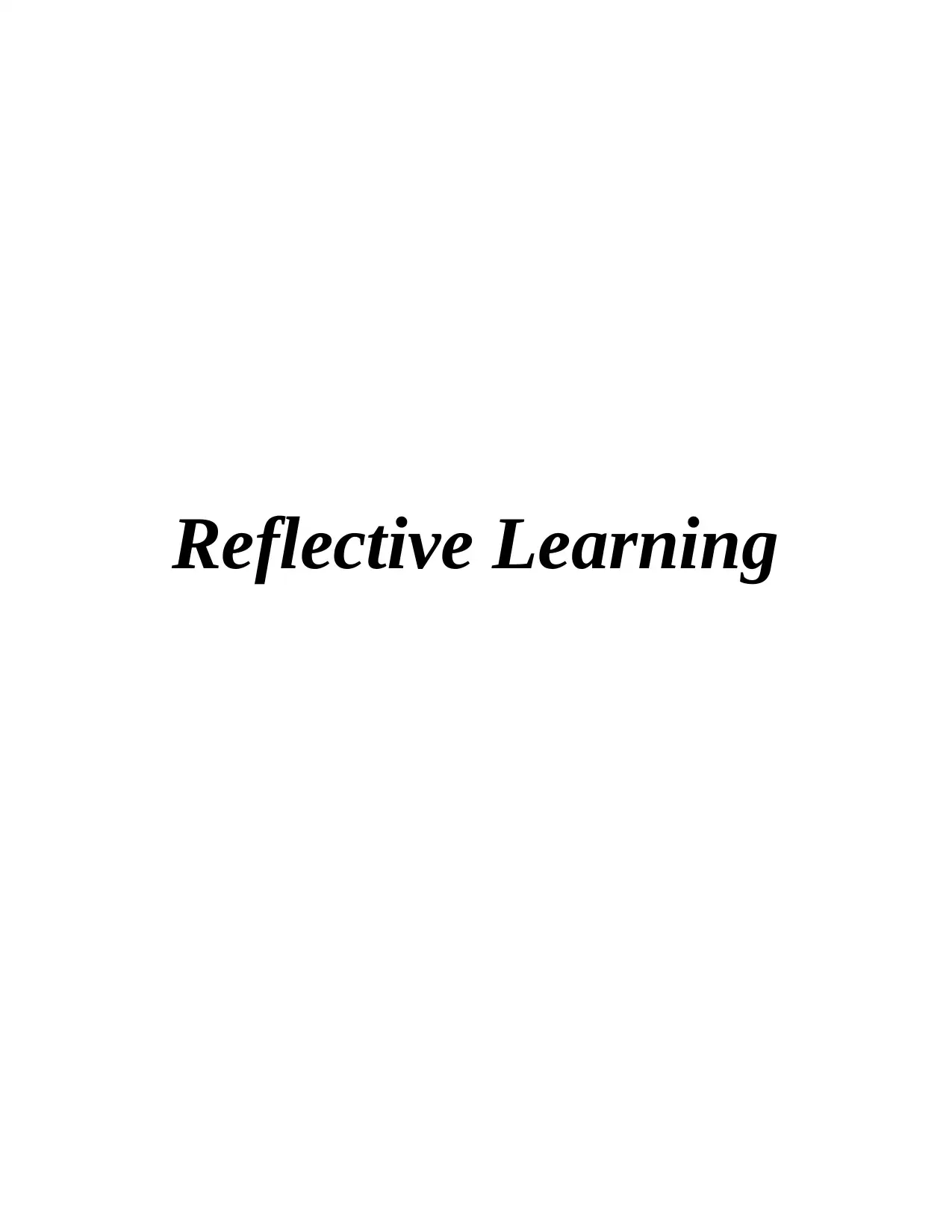
Reflective Learning
Paraphrase This Document
Need a fresh take? Get an instant paraphrase of this document with our AI Paraphraser
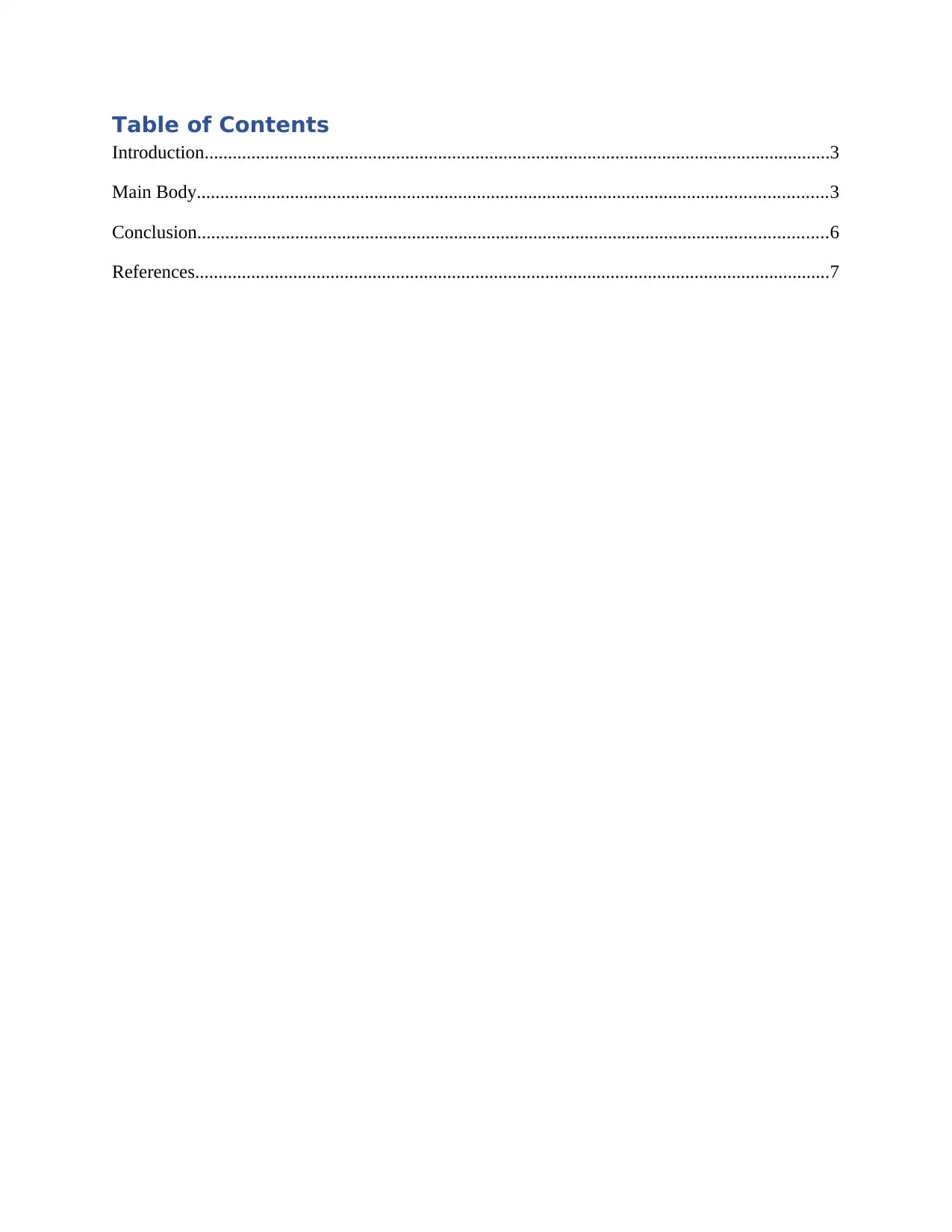
Table of Contents
Introduction......................................................................................................................................3
Main Body.......................................................................................................................................3
Conclusion.......................................................................................................................................6
References........................................................................................................................................7
Introduction......................................................................................................................................3
Main Body.......................................................................................................................................3
Conclusion.......................................................................................................................................6
References........................................................................................................................................7
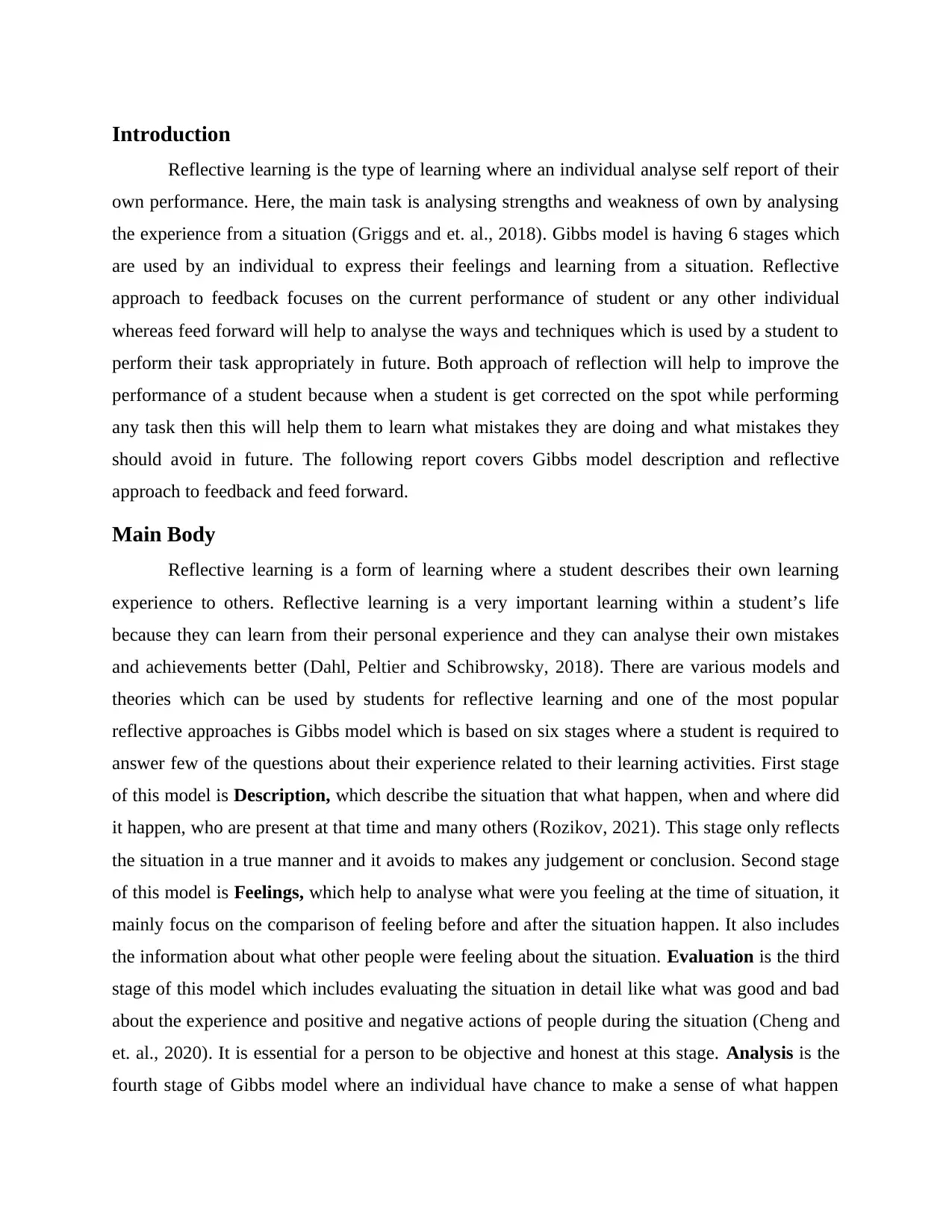
Introduction
Reflective learning is the type of learning where an individual analyse self report of their
own performance. Here, the main task is analysing strengths and weakness of own by analysing
the experience from a situation (Griggs and et. al., 2018). Gibbs model is having 6 stages which
are used by an individual to express their feelings and learning from a situation. Reflective
approach to feedback focuses on the current performance of student or any other individual
whereas feed forward will help to analyse the ways and techniques which is used by a student to
perform their task appropriately in future. Both approach of reflection will help to improve the
performance of a student because when a student is get corrected on the spot while performing
any task then this will help them to learn what mistakes they are doing and what mistakes they
should avoid in future. The following report covers Gibbs model description and reflective
approach to feedback and feed forward.
Main Body
Reflective learning is a form of learning where a student describes their own learning
experience to others. Reflective learning is a very important learning within a student’s life
because they can learn from their personal experience and they can analyse their own mistakes
and achievements better (Dahl, Peltier and Schibrowsky, 2018). There are various models and
theories which can be used by students for reflective learning and one of the most popular
reflective approaches is Gibbs model which is based on six stages where a student is required to
answer few of the questions about their experience related to their learning activities. First stage
of this model is Description, which describe the situation that what happen, when and where did
it happen, who are present at that time and many others (Rozikov, 2021). This stage only reflects
the situation in a true manner and it avoids to makes any judgement or conclusion. Second stage
of this model is Feelings, which help to analyse what were you feeling at the time of situation, it
mainly focus on the comparison of feeling before and after the situation happen. It also includes
the information about what other people were feeling about the situation. Evaluation is the third
stage of this model which includes evaluating the situation in detail like what was good and bad
about the experience and positive and negative actions of people during the situation (Cheng and
et. al., 2020). It is essential for a person to be objective and honest at this stage. Analysis is the
fourth stage of Gibbs model where an individual have chance to make a sense of what happen
Reflective learning is the type of learning where an individual analyse self report of their
own performance. Here, the main task is analysing strengths and weakness of own by analysing
the experience from a situation (Griggs and et. al., 2018). Gibbs model is having 6 stages which
are used by an individual to express their feelings and learning from a situation. Reflective
approach to feedback focuses on the current performance of student or any other individual
whereas feed forward will help to analyse the ways and techniques which is used by a student to
perform their task appropriately in future. Both approach of reflection will help to improve the
performance of a student because when a student is get corrected on the spot while performing
any task then this will help them to learn what mistakes they are doing and what mistakes they
should avoid in future. The following report covers Gibbs model description and reflective
approach to feedback and feed forward.
Main Body
Reflective learning is a form of learning where a student describes their own learning
experience to others. Reflective learning is a very important learning within a student’s life
because they can learn from their personal experience and they can analyse their own mistakes
and achievements better (Dahl, Peltier and Schibrowsky, 2018). There are various models and
theories which can be used by students for reflective learning and one of the most popular
reflective approaches is Gibbs model which is based on six stages where a student is required to
answer few of the questions about their experience related to their learning activities. First stage
of this model is Description, which describe the situation that what happen, when and where did
it happen, who are present at that time and many others (Rozikov, 2021). This stage only reflects
the situation in a true manner and it avoids to makes any judgement or conclusion. Second stage
of this model is Feelings, which help to analyse what were you feeling at the time of situation, it
mainly focus on the comparison of feeling before and after the situation happen. It also includes
the information about what other people were feeling about the situation. Evaluation is the third
stage of this model which includes evaluating the situation in detail like what was good and bad
about the experience and positive and negative actions of people during the situation (Cheng and
et. al., 2020). It is essential for a person to be objective and honest at this stage. Analysis is the
fourth stage of Gibbs model where an individual have chance to make a sense of what happen
⊘ This is a preview!⊘
Do you want full access?
Subscribe today to unlock all pages.

Trusted by 1+ million students worldwide
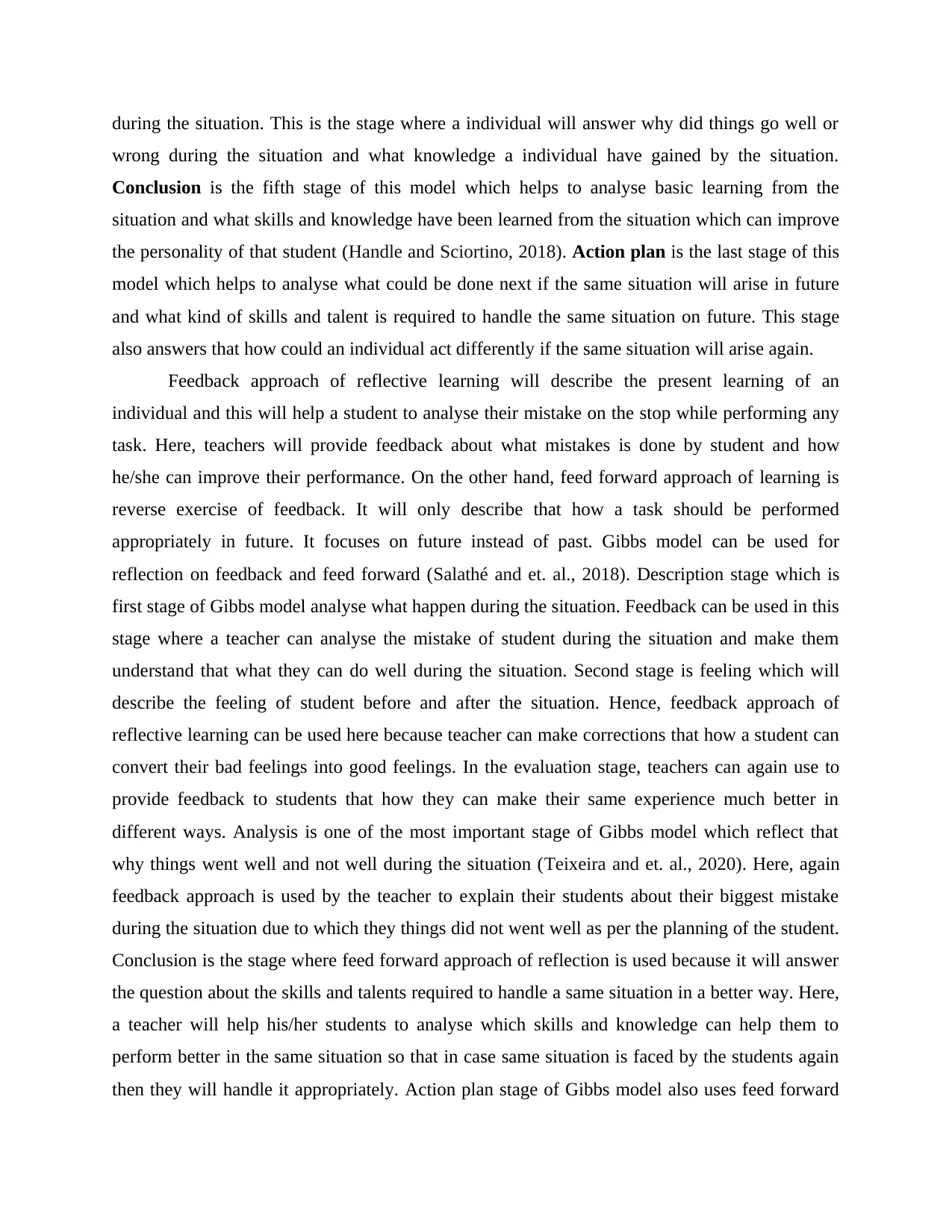
during the situation. This is the stage where a individual will answer why did things go well or
wrong during the situation and what knowledge a individual have gained by the situation.
Conclusion is the fifth stage of this model which helps to analyse basic learning from the
situation and what skills and knowledge have been learned from the situation which can improve
the personality of that student (Handle and Sciortino, 2018). Action plan is the last stage of this
model which helps to analyse what could be done next if the same situation will arise in future
and what kind of skills and talent is required to handle the same situation on future. This stage
also answers that how could an individual act differently if the same situation will arise again.
Feedback approach of reflective learning will describe the present learning of an
individual and this will help a student to analyse their mistake on the stop while performing any
task. Here, teachers will provide feedback about what mistakes is done by student and how
he/she can improve their performance. On the other hand, feed forward approach of learning is
reverse exercise of feedback. It will only describe that how a task should be performed
appropriately in future. It focuses on future instead of past. Gibbs model can be used for
reflection on feedback and feed forward (Salathé and et. al., 2018). Description stage which is
first stage of Gibbs model analyse what happen during the situation. Feedback can be used in this
stage where a teacher can analyse the mistake of student during the situation and make them
understand that what they can do well during the situation. Second stage is feeling which will
describe the feeling of student before and after the situation. Hence, feedback approach of
reflective learning can be used here because teacher can make corrections that how a student can
convert their bad feelings into good feelings. In the evaluation stage, teachers can again use to
provide feedback to students that how they can make their same experience much better in
different ways. Analysis is one of the most important stage of Gibbs model which reflect that
why things went well and not well during the situation (Teixeira and et. al., 2020). Here, again
feedback approach is used by the teacher to explain their students about their biggest mistake
during the situation due to which they things did not went well as per the planning of the student.
Conclusion is the stage where feed forward approach of reflection is used because it will answer
the question about the skills and talents required to handle a same situation in a better way. Here,
a teacher will help his/her students to analyse which skills and knowledge can help them to
perform better in the same situation so that in case same situation is faced by the students again
then they will handle it appropriately. Action plan stage of Gibbs model also uses feed forward
wrong during the situation and what knowledge a individual have gained by the situation.
Conclusion is the fifth stage of this model which helps to analyse basic learning from the
situation and what skills and knowledge have been learned from the situation which can improve
the personality of that student (Handle and Sciortino, 2018). Action plan is the last stage of this
model which helps to analyse what could be done next if the same situation will arise in future
and what kind of skills and talent is required to handle the same situation on future. This stage
also answers that how could an individual act differently if the same situation will arise again.
Feedback approach of reflective learning will describe the present learning of an
individual and this will help a student to analyse their mistake on the stop while performing any
task. Here, teachers will provide feedback about what mistakes is done by student and how
he/she can improve their performance. On the other hand, feed forward approach of learning is
reverse exercise of feedback. It will only describe that how a task should be performed
appropriately in future. It focuses on future instead of past. Gibbs model can be used for
reflection on feedback and feed forward (Salathé and et. al., 2018). Description stage which is
first stage of Gibbs model analyse what happen during the situation. Feedback can be used in this
stage where a teacher can analyse the mistake of student during the situation and make them
understand that what they can do well during the situation. Second stage is feeling which will
describe the feeling of student before and after the situation. Hence, feedback approach of
reflective learning can be used here because teacher can make corrections that how a student can
convert their bad feelings into good feelings. In the evaluation stage, teachers can again use to
provide feedback to students that how they can make their same experience much better in
different ways. Analysis is one of the most important stage of Gibbs model which reflect that
why things went well and not well during the situation (Teixeira and et. al., 2020). Here, again
feedback approach is used by the teacher to explain their students about their biggest mistake
during the situation due to which they things did not went well as per the planning of the student.
Conclusion is the stage where feed forward approach of reflection is used because it will answer
the question about the skills and talents required to handle a same situation in a better way. Here,
a teacher will help his/her students to analyse which skills and knowledge can help them to
perform better in the same situation so that in case same situation is faced by the students again
then they will handle it appropriately. Action plan stage of Gibbs model also uses feed forward
Paraphrase This Document
Need a fresh take? Get an instant paraphrase of this document with our AI Paraphraser
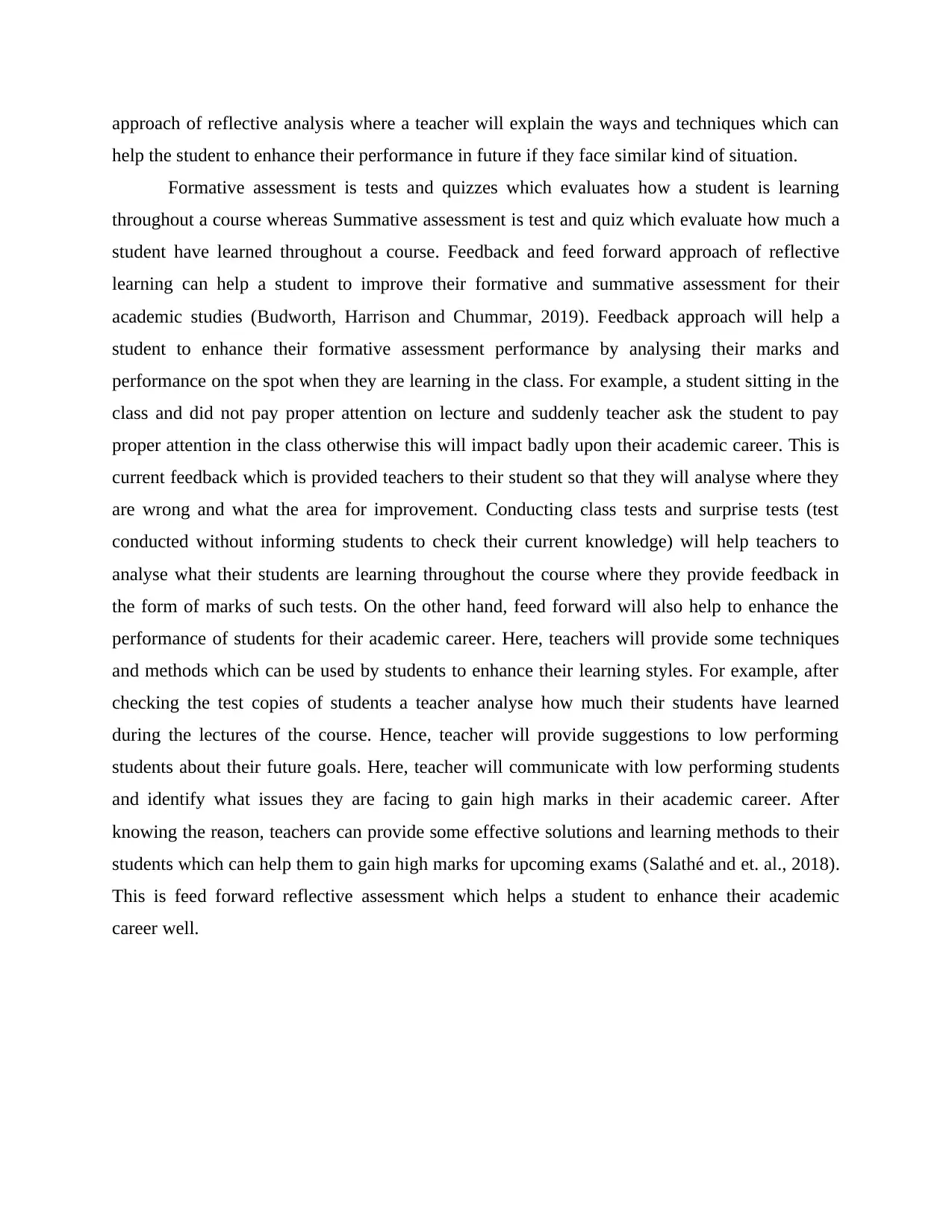
approach of reflective analysis where a teacher will explain the ways and techniques which can
help the student to enhance their performance in future if they face similar kind of situation.
Formative assessment is tests and quizzes which evaluates how a student is learning
throughout a course whereas Summative assessment is test and quiz which evaluate how much a
student have learned throughout a course. Feedback and feed forward approach of reflective
learning can help a student to improve their formative and summative assessment for their
academic studies (Budworth, Harrison and Chummar, 2019). Feedback approach will help a
student to enhance their formative assessment performance by analysing their marks and
performance on the spot when they are learning in the class. For example, a student sitting in the
class and did not pay proper attention on lecture and suddenly teacher ask the student to pay
proper attention in the class otherwise this will impact badly upon their academic career. This is
current feedback which is provided teachers to their student so that they will analyse where they
are wrong and what the area for improvement. Conducting class tests and surprise tests (test
conducted without informing students to check their current knowledge) will help teachers to
analyse what their students are learning throughout the course where they provide feedback in
the form of marks of such tests. On the other hand, feed forward will also help to enhance the
performance of students for their academic career. Here, teachers will provide some techniques
and methods which can be used by students to enhance their learning styles. For example, after
checking the test copies of students a teacher analyse how much their students have learned
during the lectures of the course. Hence, teacher will provide suggestions to low performing
students about their future goals. Here, teacher will communicate with low performing students
and identify what issues they are facing to gain high marks in their academic career. After
knowing the reason, teachers can provide some effective solutions and learning methods to their
students which can help them to gain high marks for upcoming exams (Salathé and et. al., 2018).
This is feed forward reflective assessment which helps a student to enhance their academic
career well.
help the student to enhance their performance in future if they face similar kind of situation.
Formative assessment is tests and quizzes which evaluates how a student is learning
throughout a course whereas Summative assessment is test and quiz which evaluate how much a
student have learned throughout a course. Feedback and feed forward approach of reflective
learning can help a student to improve their formative and summative assessment for their
academic studies (Budworth, Harrison and Chummar, 2019). Feedback approach will help a
student to enhance their formative assessment performance by analysing their marks and
performance on the spot when they are learning in the class. For example, a student sitting in the
class and did not pay proper attention on lecture and suddenly teacher ask the student to pay
proper attention in the class otherwise this will impact badly upon their academic career. This is
current feedback which is provided teachers to their student so that they will analyse where they
are wrong and what the area for improvement. Conducting class tests and surprise tests (test
conducted without informing students to check their current knowledge) will help teachers to
analyse what their students are learning throughout the course where they provide feedback in
the form of marks of such tests. On the other hand, feed forward will also help to enhance the
performance of students for their academic career. Here, teachers will provide some techniques
and methods which can be used by students to enhance their learning styles. For example, after
checking the test copies of students a teacher analyse how much their students have learned
during the lectures of the course. Hence, teacher will provide suggestions to low performing
students about their future goals. Here, teacher will communicate with low performing students
and identify what issues they are facing to gain high marks in their academic career. After
knowing the reason, teachers can provide some effective solutions and learning methods to their
students which can help them to gain high marks for upcoming exams (Salathé and et. al., 2018).
This is feed forward reflective assessment which helps a student to enhance their academic
career well.
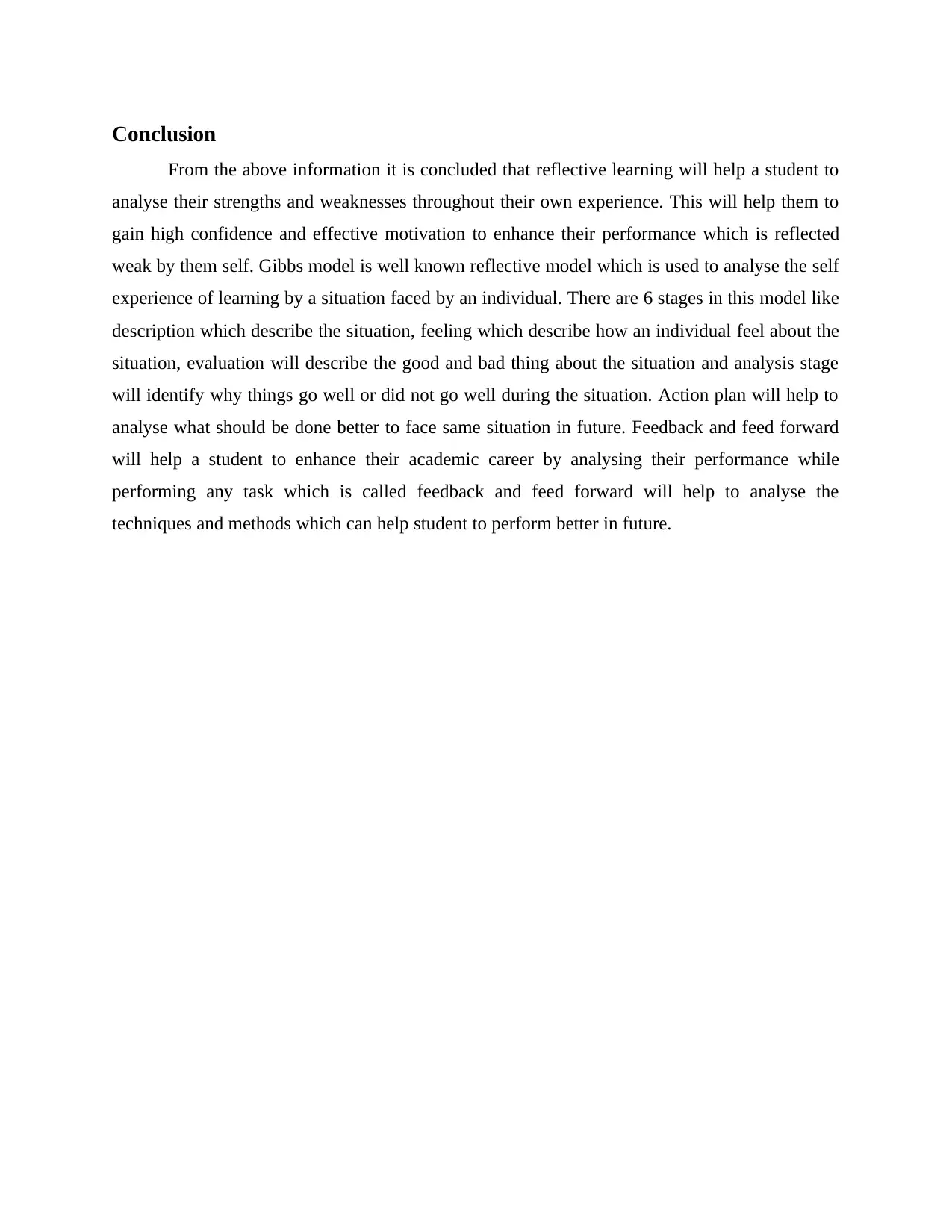
Conclusion
From the above information it is concluded that reflective learning will help a student to
analyse their strengths and weaknesses throughout their own experience. This will help them to
gain high confidence and effective motivation to enhance their performance which is reflected
weak by them self. Gibbs model is well known reflective model which is used to analyse the self
experience of learning by a situation faced by an individual. There are 6 stages in this model like
description which describe the situation, feeling which describe how an individual feel about the
situation, evaluation will describe the good and bad thing about the situation and analysis stage
will identify why things go well or did not go well during the situation. Action plan will help to
analyse what should be done better to face same situation in future. Feedback and feed forward
will help a student to enhance their academic career by analysing their performance while
performing any task which is called feedback and feed forward will help to analyse the
techniques and methods which can help student to perform better in future.
From the above information it is concluded that reflective learning will help a student to
analyse their strengths and weaknesses throughout their own experience. This will help them to
gain high confidence and effective motivation to enhance their performance which is reflected
weak by them self. Gibbs model is well known reflective model which is used to analyse the self
experience of learning by a situation faced by an individual. There are 6 stages in this model like
description which describe the situation, feeling which describe how an individual feel about the
situation, evaluation will describe the good and bad thing about the situation and analysis stage
will identify why things go well or did not go well during the situation. Action plan will help to
analyse what should be done better to face same situation in future. Feedback and feed forward
will help a student to enhance their academic career by analysing their performance while
performing any task which is called feedback and feed forward will help to analyse the
techniques and methods which can help student to perform better in future.
⊘ This is a preview!⊘
Do you want full access?
Subscribe today to unlock all pages.

Trusted by 1+ million students worldwide
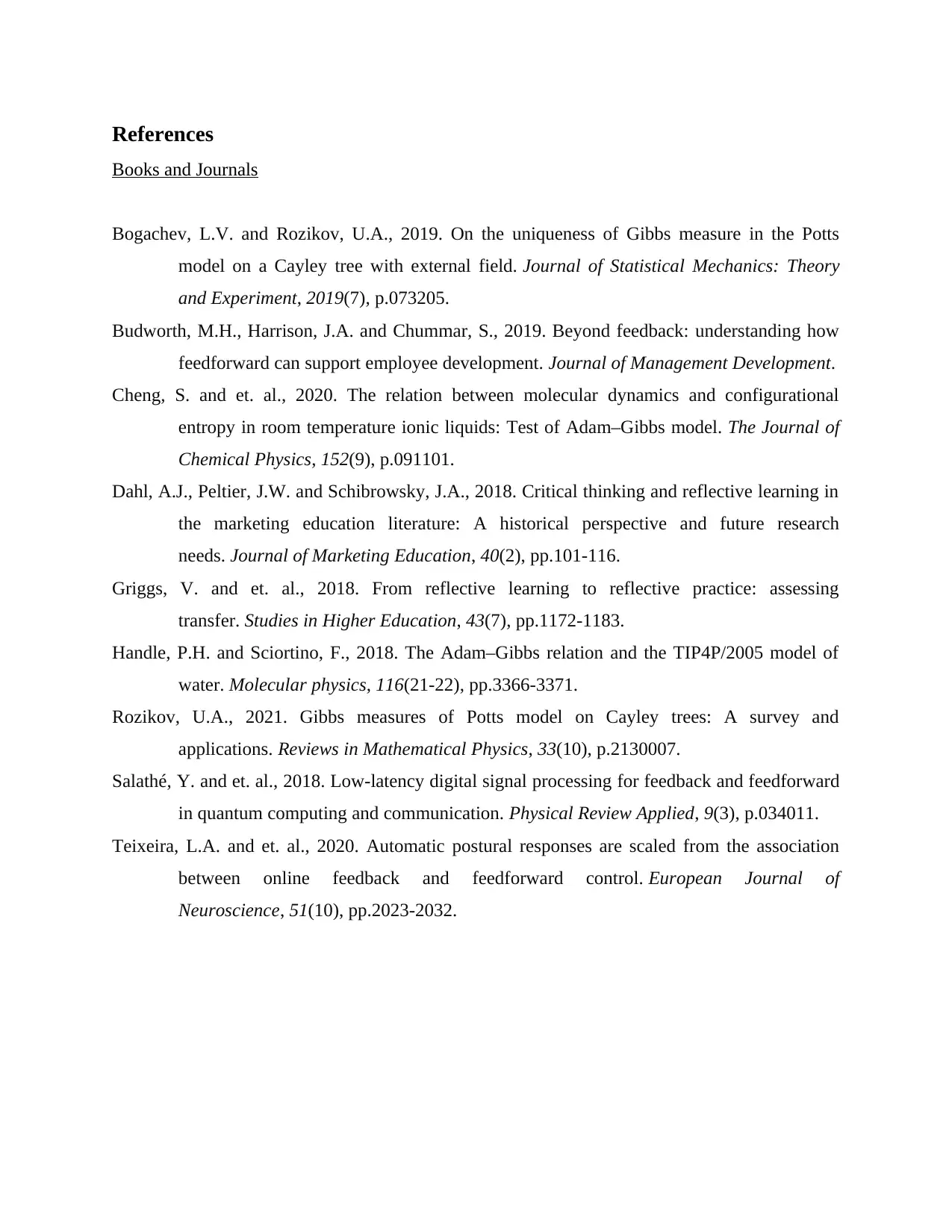
References
Books and Journals
Bogachev, L.V. and Rozikov, U.A., 2019. On the uniqueness of Gibbs measure in the Potts
model on a Cayley tree with external field. Journal of Statistical Mechanics: Theory
and Experiment, 2019(7), p.073205.
Budworth, M.H., Harrison, J.A. and Chummar, S., 2019. Beyond feedback: understanding how
feedforward can support employee development. Journal of Management Development.
Cheng, S. and et. al., 2020. The relation between molecular dynamics and configurational
entropy in room temperature ionic liquids: Test of Adam–Gibbs model. The Journal of
Chemical Physics, 152(9), p.091101.
Dahl, A.J., Peltier, J.W. and Schibrowsky, J.A., 2018. Critical thinking and reflective learning in
the marketing education literature: A historical perspective and future research
needs. Journal of Marketing Education, 40(2), pp.101-116.
Griggs, V. and et. al., 2018. From reflective learning to reflective practice: assessing
transfer. Studies in Higher Education, 43(7), pp.1172-1183.
Handle, P.H. and Sciortino, F., 2018. The Adam–Gibbs relation and the TIP4P/2005 model of
water. Molecular physics, 116(21-22), pp.3366-3371.
Rozikov, U.A., 2021. Gibbs measures of Potts model on Cayley trees: A survey and
applications. Reviews in Mathematical Physics, 33(10), p.2130007.
Salathé, Y. and et. al., 2018. Low-latency digital signal processing for feedback and feedforward
in quantum computing and communication. Physical Review Applied, 9(3), p.034011.
Teixeira, L.A. and et. al., 2020. Automatic postural responses are scaled from the association
between online feedback and feedforward control. European Journal of
Neuroscience, 51(10), pp.2023-2032.
Books and Journals
Bogachev, L.V. and Rozikov, U.A., 2019. On the uniqueness of Gibbs measure in the Potts
model on a Cayley tree with external field. Journal of Statistical Mechanics: Theory
and Experiment, 2019(7), p.073205.
Budworth, M.H., Harrison, J.A. and Chummar, S., 2019. Beyond feedback: understanding how
feedforward can support employee development. Journal of Management Development.
Cheng, S. and et. al., 2020. The relation between molecular dynamics and configurational
entropy in room temperature ionic liquids: Test of Adam–Gibbs model. The Journal of
Chemical Physics, 152(9), p.091101.
Dahl, A.J., Peltier, J.W. and Schibrowsky, J.A., 2018. Critical thinking and reflective learning in
the marketing education literature: A historical perspective and future research
needs. Journal of Marketing Education, 40(2), pp.101-116.
Griggs, V. and et. al., 2018. From reflective learning to reflective practice: assessing
transfer. Studies in Higher Education, 43(7), pp.1172-1183.
Handle, P.H. and Sciortino, F., 2018. The Adam–Gibbs relation and the TIP4P/2005 model of
water. Molecular physics, 116(21-22), pp.3366-3371.
Rozikov, U.A., 2021. Gibbs measures of Potts model on Cayley trees: A survey and
applications. Reviews in Mathematical Physics, 33(10), p.2130007.
Salathé, Y. and et. al., 2018. Low-latency digital signal processing for feedback and feedforward
in quantum computing and communication. Physical Review Applied, 9(3), p.034011.
Teixeira, L.A. and et. al., 2020. Automatic postural responses are scaled from the association
between online feedback and feedforward control. European Journal of
Neuroscience, 51(10), pp.2023-2032.
1 out of 7
Related Documents
Your All-in-One AI-Powered Toolkit for Academic Success.
+13062052269
info@desklib.com
Available 24*7 on WhatsApp / Email
![[object Object]](/_next/static/media/star-bottom.7253800d.svg)
Unlock your academic potential
Copyright © 2020–2026 A2Z Services. All Rights Reserved. Developed and managed by ZUCOL.




